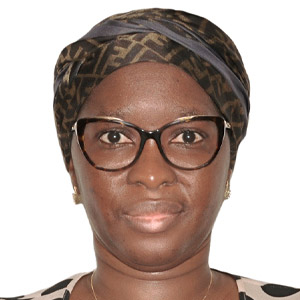
Senior civil servant since 2003, Mrs Diaw Awa Ndiaye has worked in the public sphere for over 20 years: territorial development, Mines, industries, public finances, management. She is currently Inspector General of State, a body responsible for inspection, audit, verification, evaluation, study, and research missions under the authority of the Head of State.
She defended her Executive Doctorate of Business Administration (EDBA) in October 2025, on the topic: “Change management in a public organization in the African context: how has the quality approach transformed the DGR/PR in Senegal?”, under the supervision of Professor Françoise Chevalier, professor at HEC Paris, France.
Thesis Direction
Prof Chevalier Françoise
Thesis Title
Change management in a public administration in an African context: How has the quality approach transformed the General Resources Department of the Presidency of the Republic of Senegal?
Abstract
Since independence to the present day, several strategies and reforms have been implemented to lift Africa out of the cycle of poverty and dependence and to promote the continent’s economic and social growth through various programs and plans. In Senegal, four generations of reforms have been initiated since independence to modernize the administration and foster economic and social development. However, we note the persistence of many shortcomings and deficiencies, analyzed in the literature review, which are at the root of public dissatisfaction with the services provided by the administration. It is in this context that, within the WAEMU area, a series of reforms have been undertaken, the most prominent of which is the public finance reform, which requires, among other things, member states to measure the performance of public action. Thus, the DMG/PR seized the transformation opportunities offered by a regulatory framework conducive to the modernization of the administration, while exploring paths rarely or never taken by public structures through the implementation of a quality approach.
The literature review made it possible to take stock of change management in the African context, particularly in Senegal, based on the experience of the DMG/PR, a public administration. Change management in a context marked by public finance reform within the WAEMU area. The choice of the quality approach by the DMG led us, as part of the literature review, to focus on the concept of New Public Management (NPM), which in its approach and tools has links with the quality approach, but also to the implementation of the quality approach and certification processes. Above all, it enabled us to analyze change management within the framework of implementing the quality approach. To this end, the dynamics of change were analyzed and made it possible to describe the change processes (Pichault, Castro, and Chevalier, 2021) and to analyze research on change management in public administration (Nouiker, (2021); Guyon et al., (2003)).
The epistemological stance adopted, given the research question, led us to a constructivist stance and a five-year longitudinal qualitative method. This method was based on the collection and processing of data through 42 semi-structured interviews with stakeholders (namely: DMG staff, internal actors (or internal and external clients), and external actors or DMG suppliers) and an auto-ethnography carried out by the change agent (manager-researcher) with an inductive approach that builds theoretical elements over the course of the work and a longitudinal chronological approach (before the QMS, at the launch of the QMS, during the deployment of the QMS, and after deployment results). This stance, beyond identifying organizational dynamics through the perception of actors, made it possible to consider a crucial issue: contextualization. This methodology enabled us to gather a significant body of data based on the feedback from the change agent (manager-researcher) and DMG stakeholders. But beforehand, to allow a better understanding of the entity, the organizational changes that occurred, and a better use of the results from primary data (auto-ethnography and semi-structured interviews), the context of the DMG (including the use of secondary data) was presented according to the longitudinal breakdown adopted in the methodology. Thus, from the individual perceptions of the actors, we were able to identify the organizational dynamics at work and the impact of modernization via the quality approach on the organization, functioning, and performance of the DMG, but also the impact of this modernization on the resilience and professionalization of the entity and its teams. We were also able to analyze the dynamics of change observed at the DMG: with a change imposed by regulation, a change chosen by the DMG through the quality approach, and a change negotiated with the actors. Subsequently, the analysis of the specific context made it possible to identify the levers and barriers to the deployment of the quality approach in a public service such as the DMG, particularly in the African and Senegalese context.
The use of these results then enabled us to move on to the formulation of managerial recommendations, which is the real added value of this thesis. We were thus able to highlight the levers of change, the pitfalls to avoid, and practical advice considering the modernization experience of the DMG, the literature review, but also the chosen methodology.

